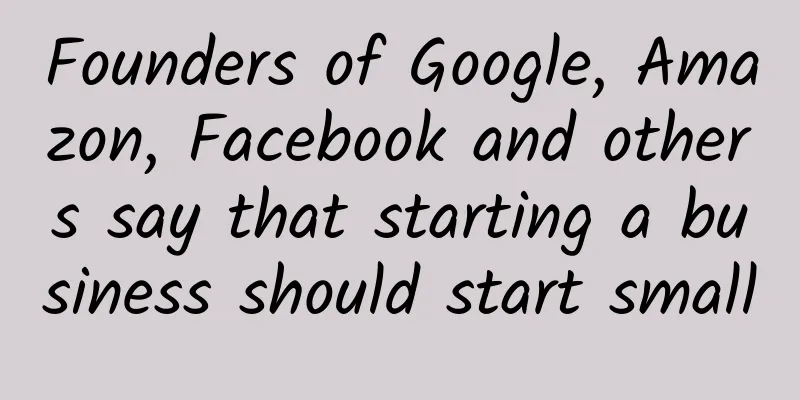Founders of Google, Amazon, Facebook and others say that starting a business should start small

|
“All the most famous and beloved things started small.” — Joel Gascoigne Joel, CEO of Buffer, wrote an article not long ago specifically describing the importance of starting small with new projects. In the article, he made a very important point that while people are amazed by other people's new products, they often ignore the long and arduous journey that others have gone through to get their products to this point.
Joel went on to mention that it is easier to succeed if you start with a small project. Start small and then grow bigger.
To further understand how some of the most important Internet companies in the world started out small, I thought it would be interesting to look back in time. The design of a company's products doesn't give us a full picture of what's going on behind the scenes, but looking at their past designs is still a way to peek into their development process. In addition, the founders of these companies have very useful advice on why they started small and why they ended up being so successful. Now let’s take a look at how these giants have transformed from being insignificant at the beginning to being so important today. Facebook — “Build a long-term product”
Zuckerberg's vision was big: to bring the world closer together through social networking. But at the beginning, his goal was just to connect college students, but today it has grown into one of the largest and most popular social networks in the world. And because of Zuckerberg's commitment to continuously build the company, Facebook continues to grow and develop today.
Facebook when it was founded in 2004 Facebook is much larger and more complex today than it was when it first started, but Zuckerberg still maintains the vision it promised back then;
Facebook in 2013 Google — “Do one thing well”
Google in 1998: Google's design has remained simple over the years, even as the company has expanded and added more products and services like Maps, YouTube, Gmail, and Drive. When you open Google.com, you'll see that Google is still focused on the same fundamentals: information retrieval.
Google in 2014 Tumblr — “Created to solve my own problems” David Karp created Tumblr out of his own desire to create it. Blogs were already popular, but the focus was on writing text — something Karp correctly judged was not something everyone wanted to do.
Tumblr in 2007 Today, Karp attributes Tumblr's success to its vision of "more stuff," like visual elements like photos and GIFs, and that Tumblr will continue to focus on building features his team loves to use.
Tumblr in 2014 YouTube — “Don’t assume you know the answers” The YouTube team promised that they would validate their assumptions and build new features based on how the community integrates with their products and based on some of their previous experiences:
YouTube in 2005 Co-founder Chad Hurley advises other startup founders to listen to their users to validate their assumptions, and not jump right into a giant product blueprint that aligns with your company’s vision:
YouTube in 2014 Yahoo! — “Preparing for future expansion” Yahoo!, like all of these companies mentioned, started as a small project that solved a specific problem: the founders were frustrated that they couldn't find pages they had visited before, so they started indexing the entire web.
Yahoo in 1996 Based on this experience at Yahoo!, co-founder Jerry Yang advises everyone to prepare for the expansion of your business:
Yahoo in 2014 Amazon — “Customer First”
Amazon's founder Jeff Bezos has always adhered to the principle of customer first, which has become Amazon's biggest competitive advantage.
Amazon in 1999 Amazon started as a small online bookseller and has become the online retail giant that sells everything today. But even with its rapid growth, Bezos has not changed his original intention of putting customers first:
Amazon in 2014 Of course, there should be many examples of people starting small and achieving great success. In Joel's article, he shared an example from Dale Carnegie's book How to Win Friends and Influence People, which started with a simple conversation and a simple note on an index card. ***You may give some domestic examples in the comments. |
Recommend
How does Valentine's Day operate?
Valentine's Day is here, and whether you are ...
Our story in Lost on Journey·ET Tribe
[[182181]]...
How to write a clear and organized promotion plan?
I have heard many of my friends and colleagues ta...
What are the promotion channels of Xiaohongshu? How to promote?
Internet business is all about traffic. The essen...
What is the logic behind new consumer brands breaking through their circle and becoming popular?
In the new consumption dimension where concepts a...
Extremely effective operation skills in headline information flow!
Hello everyone, today I will mainly share two top...
Off-site traffic? 5 tips on how to create popular articles on Xiaohongshu!
How to write a popular article on Xiaohongshu? Th...
30 Thinking Games to Ignite Your Smart Brain Video Course Baidu Netdisk Cloud
30 Thinking Games to Ignite Your Smart Brain Vide...
The era of paid content: both a hot topic and a hidden crisis
Last year, a wave of paid content entrepreneurshi...
Analysis of Kuaishou information flow advertising and advertising optimization tips!
A complete analysis of the Kuaishou information f...
Is Baidu Port Account better or Baidu Framework Account better?
Is Baidu Port Account better or Baidu Framework A...
How to choose products in Douyin live broadcast room? Four major factors in product selection!
It is said that Douyin sales rely on “70% product...
Revealing the fission tactics of Alibaba, JD.com and other Double Eleven activities!
At this moment, are you browsing your phone while...
How to choose your first programming language based on what you want in life
[[155653]] Life is easy for programmers. There ar...
Why do companies need to develop mini programs?
WeChat Mini Programs have faced many doubts since...









